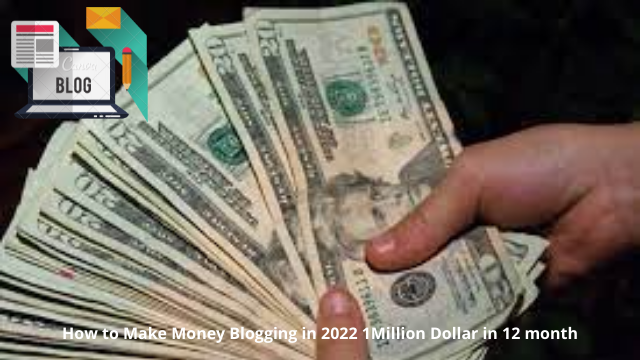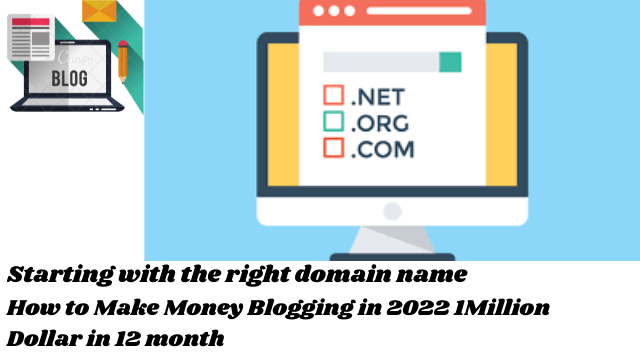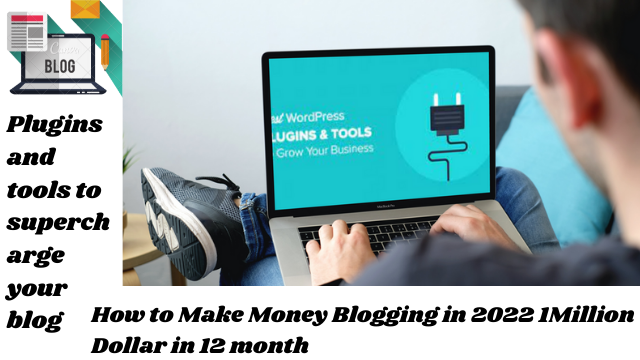1. What is a blog?
Blogging is the fastest growing and one of the most exciting forms of content marketing today. The potential for bloggers to make money from their blogs is all around us. However, many entrepreneurs struggle to understand how and why blogging is a viable income strategy or even a smart long-term investment. To help you understand blogging, I’ve created this guide to help you get started — from the basics of blog building and SEO to monetizing your blog with ads, affiliate programs, and more.
2. Why should you start a blog?
Blogging has always been a medium for spreading ideas and opinions in an easy-to-understand, easy-to-digest manner. The way you present your own thoughts is crucial to becoming a successful blogger.
There are a few steps you can take to help you get started:
1. (For the non-techies) Think of the following three questions when you're thinking about what kind of blog (or websites) you want to start:
• What are the main topics I want my readers to care about?
• What is the tone and style of my blog?
• How will I promote my blog, and how will I attract readers?
2. (For more techy folks) Think of the following three questions when you're thinking about what kind of blog (or websites) you want to start:
• What are the main topics I want my readers to care about?
• What is the tone and style of my blog?
• How will I promote my blog, and how will I attract readers?
3. How to start a blog in 7 easy steps
Blogging can be an amazing way to reach customers and find new ones, but it can also be a great way to make money.
In fact, it is probably the easiest way to make money online.
But as a blogger yourself, you know that there is no guarantee of success. Some people get lucky and have a hit, but most don’t.
That’s why I’m helping you figure out the best ways to make money blogging in 2022: by helping you get the most bang for your buck possible now. There are many ways you can earn money with your blog — from affiliate marketing to advertising, to paid review gigs (gambling ads). But if you use my proven strategy and tactics, it will be easy for you to earn big bucks every month with your blog. It all starts with following this one simple step at a time:
• Identify your audience
• Know what they want and need
• Develop a plan for monetizing your blog so that you can start making more than $1 million in one year!
You can do this by setting up sales pages where you showcase products or services that interest your audience–and then getting paid when they buy them. You could also create videos that help people find products they need or want (or both). Or maybe you could run an ad campaign on social media–where people have an opportunity to win free stuff or pay for things they enjoy doing with friends or family. Every kind of online advertising has its place in the scheme of things: if being able to pay me is important enough for you, I recommend sticking with banner ads and online ads from reputable companies like Google AdWords. If all else fails (and there are times when it doesn’t), try emailing your list about a product or service that might interest them (this is known as “cold emailing”) — something like, “I was thinking about buying this item at Amazon today… would this be something we could discuss? interested in learning more about it. After all… everyone likes free stuff! In the US at least (and hopefully everywhere), buying things through Amazon Prime Services isn’t always needed: most items ship within 2-3 days; some may even arrive earlier than that! So I think many
4. Starting with the right domain name
The right domain name is extremely important. It is a ton of work, but if you can get the right domain name, it will make a huge difference. The first step in getting that name is to check out what’s available (at registrars like Namecheap or GoDaddy).
One of the most popular domains on the market is: “blog.” This can be a great option because it is one of the most recognizable and well-known brands in the world (and has been for over 30 years). However, there are two reasons why this domain may not be what you think it would be:
1. It comes from “blog” (the plural) instead of “blogger”
2. The name hasn’t been used for 30+ years (which means no logos or trademarks)
When I started my blog, I was able to get by with “experts-in-nyc.com.” This was one of the first blogs I ever wrote for myself, and it wasn’t just the right word choice; the domain itself ended up being very relevant to me at that time as well…but nothing more than a placeholder while I tested different variations on my own terms and found what worked best for me. If you have any other good options, feel free to leave them in this thread!
5. How to choose a blogging platform
A blog is a great platform to share your experience and knowledge. However, many people forget that bloggers, they can make money doing it.
I recently joined the Forbes 30 Under 30 list and was pleased to learn that a number of my peers are in the same situation I am: they are making money blogging and have been doing so for years. The most recent example of this is a fellow I know who has been blogging since 2022 when he started out with just $1,000 and now makes over $120,000 per year from his niche blog.
I’m not going to try to convince you — nor will I claim you should do exactly what he does — but rather I’ll show you how he did it. This is a 7-step guide for anyone who wants to create a profitable blog on their own or who wants to help an entrepreneur become financially successful.
Step 1: Research your niche
This is by far the most important step in creating your blog because it determines how much traffic you get from dedicated readers (your readership) and how much traffic you get from general readers (the audience).
Your niche might be something like “blogging tips” or “how to increase sales” or “how to build your email list” or “how to improve SEO”. Whatever it is that makes sense for you as a reader, don’t let that limit the kind of topics you cover and the things you can write about on your blog (or at least don't write about them unless they are within your niche).
Keep in mind that if you only have time for one category of topics (or if there are too many categories), then only choose one or two things per category (you will be able to focus on them better than if there were more categories). For example, if you're reading about SEO, then if Google doesn't like what you write about SEO, at least don't write about Search Console integrations because Google doesn't care what Google thinks about that topic.
Step 2: Choose Your Blog's Theme / Design
Themes come in different shapes and sizes; some look like logos; others look like real things people do (like Microsoft Word). You can choose either to stick with something simple or try something new. For example, if you are an SEO blogger and want your website's look to reflect its purpose/niche/target market but still want something
6. Choosing a WordPress Theme that converts
The great thing about WordPress is that it’s very flexible. You can choose from a range of cool and colorful themes, which you can easily customize. The downside to WordPress is that it’s not as easy to manage as other platforms like Joomla or Drupal.
So for this post, we’re going to take a look at some of the best themes out there and show you how you can use them to build your own blog (and maybe even make some money).
7. Plugins and tools to supercharge your blog
The first question many people ask me when I tell them I made $1 million with my blog in 2 years is: “How did you do that?” The answer is not that easy.
But the good news is, I don’t have to make it easy; rather, I can make it much easier for you to start making money with your blog in less than two years.
Although these are not the most important topics in this post (those are coming later), they are an excellent place to start if you want to get started on this journey.
Here we go…
Many of the posts just below will be a bit more technical and will require some technical background, so please read all of them if you have any desire to learn how to apply what we’re talking about. Although we won’t be diving into deep-dive technical details about plugins here, there is a lot more information available elsewhere. In fact, there are tutorials on many popular sites which can help you out...





0 Comments